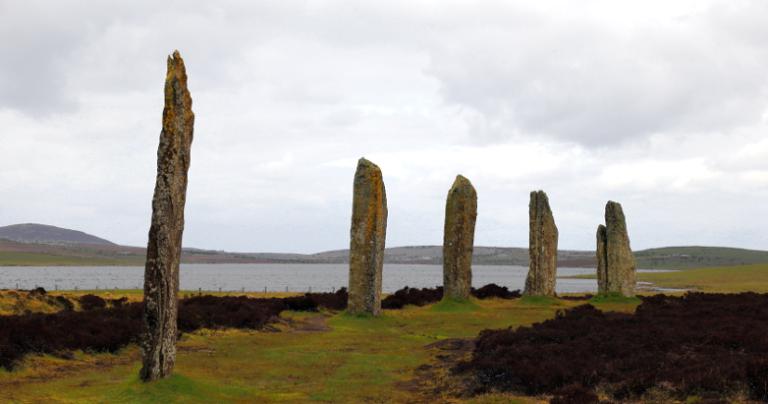The Cauldron of the Dagda is one of the Four Hallows of the Tuatha De Danann. No company ever went away from it unfilled. No matter how many people needed to be fed, there was always enough food for everyone. Over the centuries the Cauldron has taken many forms, but in this original form it was hospitality technology – a tool and a method of providing hospitality.

Ordinary hospitality
Hospitality is the process of making guests feel welcome and taking care of their needs. It is one of the core virtues of Paganism and of humanity in general. The Proto-Indo-European word *ghosti is the root of the English words for both guest and host, which points toward the shared obligations of both.
In the ancient world, hospitality frequently meant opening your home to strangers. Travel was slow and dangerous and in many places accommodations simply didn’t exist. Sleeping outdoors left travelers vulnerable to the elements, to wild animals, and to human predators. Food and water could be difficult or impossible to find. Particularly in harsh environments, refusing hospitality was tantamount to saying “I don’t care if you live or die.” Providing hospitality was and is a sign of respect for others and their inherent worth.
Pagan groups sometimes struggle with providing hospitality to our visitors. We forget about the strangers who went to the trouble of coming out to our event and spend all our free time talking with our friends. But with mindfulness and some good processes, we can show proper hospitality to all.
The recent hurricanes and wildfires have re-emphasized the need for ordinary hospitality. Some needed temporary housing and short-term assistance until they could return to their homes. Others needed – and continue to need – long-term assistance rebuilding their lives.
Have you checked in with your friends and family in impacted areas? The need for assistance extends long after the storms are gone.
Although the need for ordinary hospitality is great, there is another form of hospitality. The need for it is great too.
Spiritual hospitality
Ordinary hospitality means providing food, drink, shelter, and other necessities to guests when they present themselves to you. But many times people show up at our doors (literally or metaphorically) looking for something less tangible. They’re looking for help dealing with the Big Questions of life. They had an encounter with a God or a spirit and they need help figuring out what to do next. They’re on a spiritual journey and fate or chance or the Gods Themselves brought them to you.
They need hospitality every bit as much as those in need of physical sustenance. How can we provide it? Is there a Cauldron of the Dagda for spiritual hospitality? What hospitality technologies do we have, and what technologies we need to build?
A way for people to find you
You can be the most competent and generous host in the world, but that won’t do any good if people can’t find you. Do you have a website, a Facebook page, or a Twitter account? A booth at Pagan Pride Day? A presence at regional and national gatherings?
There are some traditions who see finding them as an ordeal in and of itself: “if you’re supposed to find us, you’ll find us.” I respect that approach, if there’s some thought and intention behind it. But if you’re not an occult (i.e. – “hidden”) group, that’s not tradition, that’s just laziness and inhospitality.
Make it clear who you are and who you aren’t
Lots of people say “everyone is welcome!” No one really means it. At our rituals, Denton CUUPS says “we welcome all who come in love and friendship.” But Nazis aren’t welcome. White supremacists aren’t welcome. Open minded Christians and Nature-centered non-theists are very welcome – fundamentalists of any persuasion aren’t.
Nobody takes everybody. Some people say “everyone is welcome” but what they really mean is “we want everyone to come in so we can change them to be just like us.” That’s not practicing hospitality, that’s proselytizing.
Beyond these (hopefully) obvious examples, even as a generic Pagan group you can’t be everything to everyone. If your emphasis is Nature spirituality and environmental activism, say so. If it’s devotional polytheism, say so. If it’s Gardnerian Wicca, say so. It is not inhospitable to say “we don’t do what you’re looking for.”
Of course, that means you have to know who you are.
What do you teach?
Once you know who you are, you can start figuring out what you need to teach. And that process begins with understanding that you can’t teach what you don’t know. Maybe you can “stay one lesson ahead” on some subjects, but magic and religion aren’t on that list.
What do you know well enough to teach? What’s important enough to you or your group that you need to teach it? What are the foundational principles, the core practices, and the experiences someone needs to have along the way?
How will you teach it?
Some witchcraft traditions teach one-to-one, face-to-face. That’s an excellent way to learn, but it’s not the only way. Classes can be held in person or on line. OBOD has one of the best teaching systems in the world – and not just the Pagan world. They still operate as a postal-mail correspondence course. Many (probably most) contemporary Pagans have done most of their learning from books. I’ve learned much of what I know by diving in head first and learning by doing.
There are many ways to teach. Choose the one(s) that match your material, your teaching skills, and your students’ needs.

Listening
If you don’t listen to your guests, how can you know what they need? Are they in spiritual trauma? Do they need magical first aid? Or do they need more mundane assistance?
Sometimes you have to turn people away – you don’t offer what they need. Sometimes you need to refer them to another group – if you’re a devotional polytheist group and they want non-theistic Nature spirituality, point them in the right direction. Sometimes they need what you have, but not exactly in the way you’ve been doing it.
We are not fundamentalists – no one way is right for everyone. Don’t be so eager to teach a newcomer that you fail to discern if they really need what you can offer.
Transmitting secrets
Do you have secrets? Of course you do. Maybe you have sacred names, deep mysteries, or rituals involving great vulnerability. These must not be profaned (i.e. – “made ordinary”) by letting them become widely known. They’re usually guarded with careful protocols and with dread oaths.
Or perhaps your secrets are hidden in plain sight. Perhaps your secrets are something special about the culture of your group: a food you always eat, a color you always wear or a color you never wear, a song that has a special meaning no one can describe but everyone knows is important.
When the time comes to share these secrets, how will you transmit them? Revealing them by telling them is perhaps the least effective method. How can people uncover these secrets and experience them for themselves?
Transmitting secrets and mysteries is a mighty technology.
Transmitting power
We can argue for days and days about whether or not groups or individuals have power they can transmit to new initiates. This isn’t unique to Pagans – Christians have been arguing over apostolic succession at least since the Protestant Reformation. But it’s part of many traditions.
Here’s a Wiccan example:
The initiator the kneels besides the candidate, places his or her right hand on the candidate’s head, and the left hand just beneath the candidate’s knee as the latter remains kneeling.
Initiator: Do you vow all between these hands to the Old Gods of witchcraft?
Candidate: I do.
Initiator: I will the powers of witchcraft into you.
Doreen Valiente – Witchcraft For Tomorrow (1978)
Does that accomplish anything? I can’t say – I’ve never tried it. But I clearly remember the moment of investiture at my first Pagan initiation. Something powerful happened, and it felt right.
I tend to think the initiators in these cases aren’t the source so much as they’re the facilitators and the conduits. The magic, the power, the current – call it what you will – flows through them and into the candidate.
If your tradition has such a feature, you need a way – a technology – to transmit it.
The privilege and responsibility of being a host
Hospitality is a form of reciprocity: “I give so that you may give.” Someone helped you get started. Maybe it was a teacher, an author, an artist, or Nature herself. Because someone showed hospitality to you, you learned and you grew and you became more than what you were before.
If guests knock on your door, it means you’ve done something to get the attention of someone… or Someone. You have been a guest. Now it’s time to be a host.
What hospitality technologies will you learn and master?
















